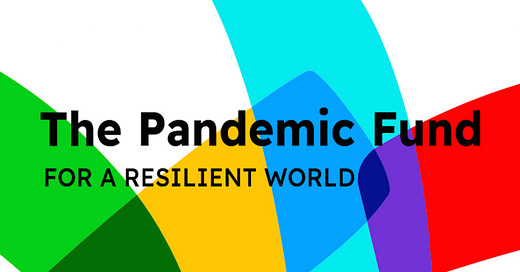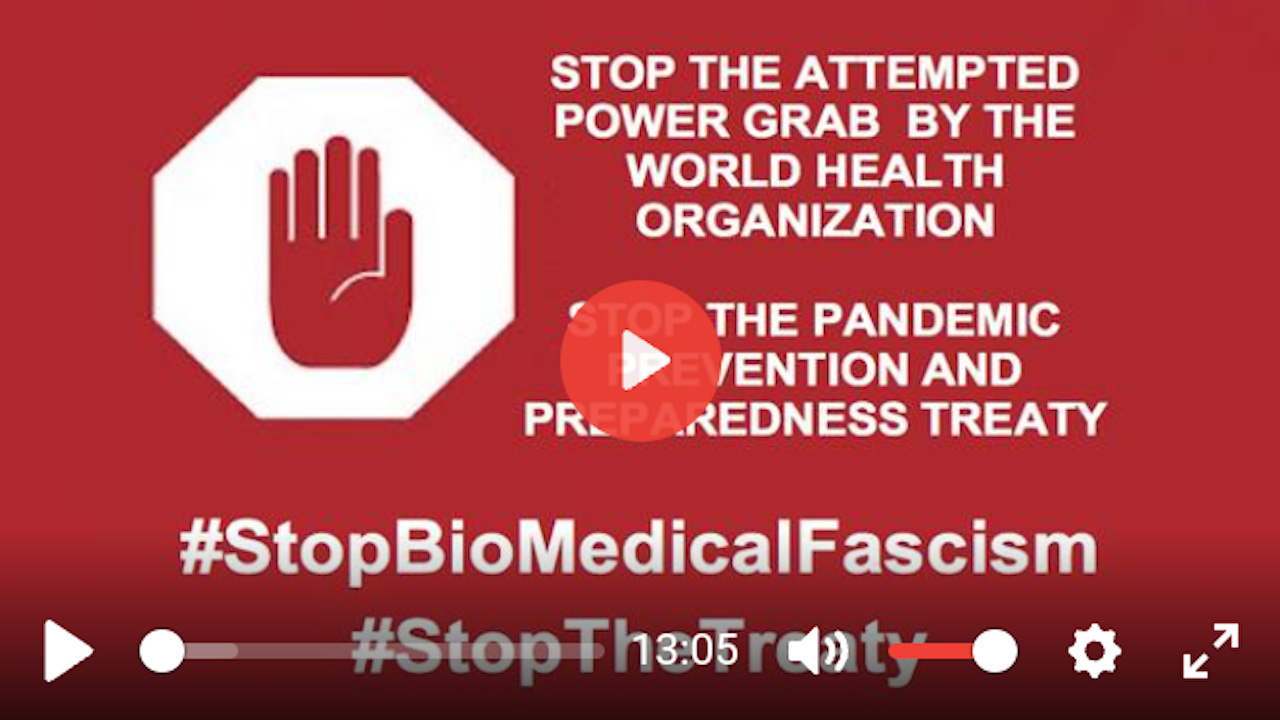FOLLOW THE DAMN MONEY!
Whether the "Pandemic Treaty" or the amendments to the IHR are adopted or not, the massive investment of the Pharmaceutical Hospital Emergency Industrial Complex will continue. FOLLOW THE DAMN MONEY!
This is about money. It is always about money.
WE HAVE ALREADY LOST CONTROL OF OUR GOVERNMENTS TO THE PHARMACEUTICAL HOSPITAL EMERGENCY INDUSTRIAL COMPLEX.
Tedros Adhanom Ghebreyesus and the World Health Organization suffer from “fund envy.”
They, and the member nations of the WHO, want more money.
They want a lot more money.
They all want in on the Fascist organized crime and money laundering operation being perpetrated by the Pharmaceutical Hospital Emergency Industrial Complex that is working in tandem with our “regulatory” agencies and non-government organizations in the form of Public-Private Partnerships.
CRACK THE CODE: In finance, “equity” is an ownership interest.
EQUITY = MONEY.
The problem has always been, and probably always will be about money.
I published the video below on March 19, 2022.
PLEASE WATCH THE VIDEO BELOW...
https://www.bitchute.com/video/jelwAdc9Myjf/
Please watch Tedros’s speech below. The video is time-stamped so you can go directly to his presentation. Tedros’s speech begins at 1:58:57.
https://www.youtube.com/watch?v=Y3RVd_yoUfE&t=7137s
The Indonesian Health Minister told the world the truth back in November 2022:
He was talking about the NDAA that was passed a month later…
The National Defense Authorization Act (NDAA)
SEC. 5564. GENERAL PROVISIONS (page 966)
(a) AUTHORIZATION OF APPROPRIATIONS.— (1) IN GENERAL.—There is authorized to be appropriated $5,000,000,000 for the 5-year period beginning on October 1, 2022.
https://www.congress.gov/117/bills/hr7776/BILLS-117hr7776enr.pdf (pages 950-967)
PLEASE NOTE THAT THE CHART BELOW IS IN MILLIONS
ETHIOPIA HAS RECEIVED FUNDING:
Ethiopia — Pandemic Multi-Sectoral Prevention, Preparedness, and Response (EPPR)
https://twitter.com/Pandemic_Fund/status/1756161343382855952
https://twitter.com/WHOEthiopia/status/1755205344945492265
The Pandemic Fund’s Governing Board has approved grants under its first round of funding allocations, aimed to boost the resilience to future pandemics in 37 countries across six regions. The selected 19 projects will receive funding to strengthen disease surveillance and early warning, laboratory systems, and health workforce.
Single Country Projects:
Cabo Verde — Strengthening National Health Security through the One Health Approach
Cambodia — Pandemic Prevention, Preparedness, and Response (CamPPR)
Ethiopia — Pandemic Multi-Sectoral Prevention, Preparedness, and Response (EPPR)
India — Animal Health Security Strengthening for Pandemic Preparedness and Response
Kazakhstan — Strengthening the National Capacity for Pandemic Preparedness and Response to Infectious Disease Outbreaks
Mongolia — Strengthening Pandemic Prevention, Preparedness, and Response through One Health
Nepal — Strengthening Pandemic Preparedness for Early Detection (SPEED)
Paraguay — Strengthening Pandemic Prevention, Preparedness, and Response
Togo — Health Emergencies Preparedness and Response Strengthening
West Bank and Gaza — Strengthening Pandemic Prevention, Preparedness, and Response
Zambia — Multisectoral Pandemic Preparedness and Response Project (ZaMPPR)
Multi-country / Regional Projects:
Regional Project led by CARPHA in Latin America and the Caribbean — Reducing the Public Health Impact of Pandemics through Strengthened Integrated Early Warning Surveillance, Laboratory Systems, and Workforce Development [Antigua and Barbuda, Belize, Dominica, Grenada, Guyana, Haiti, Jamaica, St. Kitts and Nevis, St. Lucia, St. Vincent and the Grenadines, Suriname, and Trinidad and Tobago]
South America — Pandemic Response Optimization Through Engaged Communities and Territories (PROTECT) [Bolivia, Brazil, Chile, Colombia, Ecuador, Paraguay, and Uruguay]
Europe and Central Asia — Pandemic Preparedness and Response through a One Health Approach [Kazakhstan, the Kyrgyz Republic, Tajikistan, Turkmenistan, and Uzbekistan]
Examples of types of activities that can be financed under the Second Call For Proposals (CfP)
Within each of the three priority areas for the second CfP, countries and regions may have different investment needs. A brief description of the types of activities that could be financed under the CfP in each of these areas is presented here, noting that proposals may cover one or more of these priority areas and may include activities at the intersection of the three areas:
1. Early Warning and Disease Surveillance Systems:
IHR (2005) and WOAH Standards require rapid detection of public health threats, as well as risk assessment (including understanding of drivers of emergence), notification, and response. A sensitive, collaborative surveillance system is needed to ensure early warning and to provide information for an informed decision-making process during public health events and emergencies. This involves a multi-sectoral and integrated health system approach, including monitoring outbreaks and emerging diseases in domestic and wild animals, antimicrobial resistance, community-based surveillance, clinical surveillance, sentinel surveillance systems and contact tracing during health emergencies, among others. The surveillance system should have the capacity to facilitate cross-sectoral analysis, coordination and communication in line with a One Health approach and based on international standards, good governance practices, guidance, and best practices, to minimize the transmission of zoonotic diseases to human populations. Investments in this area lead directly to improvements in early detection which can catalyze rapid responses. Proposed activities should build on elements of surveillance systems already in place and promote compatibility and interoperability to prevent duplication or further fragmentation.
The type of surveillance applied depends on the objectives of the surveillance, the available data sources and the outputs needed to support decision-making. Besides traditional epidemiological surveillance, early detection of unusual events and health event surveillance (event-based surveillance) contribute to early warning systems. Stronger surveillance systems require, for example, investments in:
a) state of-the- art digital tools to enable public health entities (including local hospitals, laboratories and veterinary services, environment protection services) and local communities to generate and share confidential data with national, regional and global public health institutions (ensuring common protocols for sharing data), and two-way information systems so that feedback mechanisms related to the communication on data are established, including domestic and wild animal and environmental health surveillance;
b) strong and interconnected national and regional centers of expertise for collaborative inter-sectoral surveillance and sharing of data, building on existing, proven systems that are interconnected in a global surveillance network , including via sewage and wastewater monitoring as a sentinel surveillance tool;
c) multi-sectoral genomic sequencing networks and capabilities and exchange of data mechanisms, including in bioinformatics, to detect new variants and pathogens as they arise in people, animals and the environment, consistent with the WHO’s 10-year strategy for genomic surveillance of pathogens with pandemic and epidemic potential;
d) training to help national/regional public health, animal health and environmental health agencies generate and analyze data to strengthen national capacities for public health intelligence (e.g. analysis of unstructured data for rapidly identifying and monitoring concerning health events reported in media); and
e) strengthening science-society-policy dialogue relevant to surveillance issues to ensure engagement with local communities and relevant stakeholders of the civil society and to promote One Health collaboration between agencies.
2. Laboratory Systems:
Laboratories are critical to surveillance, detection, and response. Strengthening laboratory systems requires investments across several areas and sectors, for example, in:
a) specimen referral and transport systems to ensure that specimens can be shipped in a timely manner to appropriate reference laboratories, as necessary;
b) developing and implementing national biosafety and biosecurity systems that allow for pathogens to be identified, characterized and monitored according to best practices, including activities such as a biological risk management training, country specific biosafety and biosecurity legislation, associated data management, laboratory licensing and pathogen control measures, and ensuring veterinary expertise is represented;
c) strengthening lab quality management systems;
d) building capacity to ensure reliable and timely testing including relay of results;
e) ensuring appropriate deployment, utilization and sustainment of modern, safe, accurate, affordable, and appropriate diagnostic tests and devices across human and animal analysis; and
f) establishing and managing diagnostic networks.
These investments are needed at the national level as well as across and between countries to strengthen existing networks of reference laboratories and specialized centers linked, for example, to WHO, FAO or WOAH.
3. Human Resources / Public Health and Community Workforce Capacity:
A multi-sectoral workforce is key to enabling prevention, early detection, and rapid response to potential events of concern at all levels of health and community systems, as required by the IHR and WOAH Standards, at a minimum. The availability and accessibility of a quality health workforce for surge capacity in emergencies, including a workforce for surveillance (e.g., field investigation and contact tracing teams, logisticians, laboratory personnel, animal and environmental health experts, clinicians, communications and event managers, and experts in finance, human resources, supplies, etc.) and for early warning and awareness raising, is critical to prevention efforts, building the resilience of communities and for the continuity of health services during an emergency.
This priority requires investing in a well-educated, trained and appropriately compensated workforce, to ensure readiness for surges of workforce across sectors during public health emergencies and for constant, sustained effort on prevention and surveillance between emergencies. Training must be based on up-to-date curricula, common standards, and competencies, reflecting an interdisciplinary approach for pandemic prevention, preparedness and response, as well as One Health. Building regional centers of expertise that can serve as hubs for education and training, as well as national and regional cadres of primary health care workers, with the necessary training on pandemic PPR and public health, could play a useful role.
I first wrote about the World Bank Pandemic Fund well over a year ago…
https://twitter.com/Pandemic_Fund
December 22, 2023
September 12, 2023
July 20, 2023
June 30, 2023
June 26, 2023
https://blogs.worldbank.org/health/we-are-still-unprepared-next-pandemic-we-can-fix
June 12, 2023
April 5, 2023
LEARN MORE…
Informed-Dissent.com
StopTheGlobalAgenda.com
ThePeoplesDeclaration.com
ExitTheWHO.org
ExitTheWHO.com
RejectTheAmendments.com
StopTheAmendments.com
StopTheWHO.com
ScrewTheWHO.com
MaskCharade.com
PreventGenocide2030.org
Under Development…
DemandHealthFreedom.com
DemandHealthFreedom.org
HealthFreedomBillOfRights.com
James Roguski
The old system is crumbling, and we must build its replacement quickly.
If you are fed up with the government, hospital, medical, pharmaceutical, media, industrial complex and would like to help build a holistic alternative to the WHO, then feel free to contact me directly anytime.
JamesRoguski.substack.com/about
JamesRoguski.substack.com/archive
310-619-3055
All content is free to all readers.
All support is deeply appreciated.






















Mr. Roguski,
We all owe you a debt of gratitude (and more than a few coins) for the enormous amount of work and time you've spent alerting/warning us about the dangers of these psycho globalists and their fiendish plans for humanity.
Will we collectively wake up? tick-tock.............thanks a million!
Yes. Always follow the money. Well done James.